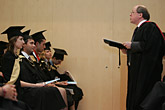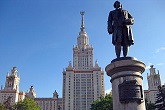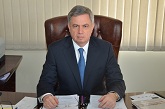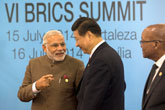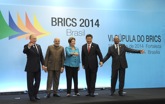New phase in Russia-India relations must be serious, long lasting
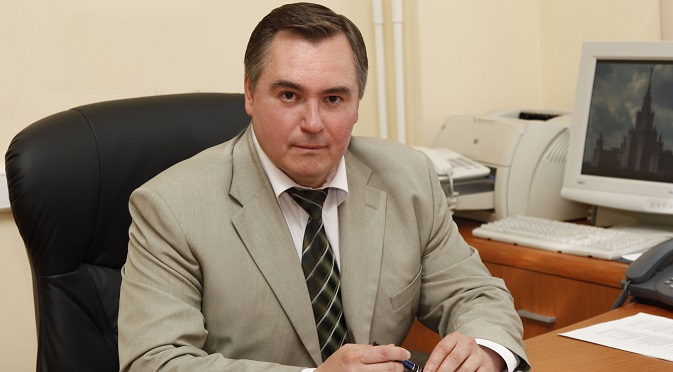
Andrei Shutov: "Russians have always been interested in India – her rich culture, traditions, and customs." Source: MSU
The Faculty of Political Science of Lomonosov Moscow State University and the School of International Studies of Jawaharlal Nehru University recently signed their first cooperation agreement. The Dean of the Faculty of Political Science Andrei Shutov talks to RIR about the essence of the document and how Russian policymakers are turning towards India.
The dean of Russia’s chief political science department visited India for the first time. Was this another instance of our country’s changing its priorities in favour of India?
I would hesitate to evaluate our humble visit as an event of global significance. But it seems to me that we certainly did, at our level, implement something within this new vector in Russia’s foreign policy. How effective our visit was will be seen in the near future when the agreement starts working. For our part, we are prepared to fortify and develop this vector.
What is the essence of the agreement?
The essence of this agreement includes, first of all, the conducting of joint research on international political processes. We have also agreed on specific research projects. In particular, our Indian colleagues have proposed we carry out joint research on the specificities of perceptions Russians have about India and vice versa. We have a defined methodology for carrying out such research and we are prepared to share it with Jawaharlal Nehru University within the framework of this project.
In addition, we must ensure academic mobility. Many of our students and graduate students are interested in India and its political system and culture. So the signed agreement, undoubtedly, will create the necessary organizational basis for their fellowships and for them to collect materials for dissertations and theses.
No less important is cooperation at the professorial level. The agreement will open the way for teachers to give lectures on a reciprocal basis in Moscow and New Delhi.
When do you expect the see the first real steps taken within the framework of the agreement? Will they be students’ fellowships or teaching exchanges?
We are putting the maximum effort into getting the agreement to start working as soon as possible. If we talk about concrete dates, then we will begin implementing bilateral projects as early as January.
When you went to the School of International Studies, it would have been impossible not to notice the signs hung around the building. On them one can see excerpts from the works of Lenin and Marx, harsh attacks on the current Prime Minister of India Narendra Modi, and calls for an “end to the genocide of the Palestinian people by Israel.” In the last case, I am citing directly. Do you allow such freedom of opinion in your faculty?
We have people with various political points of view working and studying in this department. But when we formed the faculty six years ago, we agreed that all political attachments would be manifested outside of its walls. In here, we research politics and teach political science. These are different things.
But this does not mean we cannot invite politicians to visit us and talk about their parties, movements, and state activities. But this is for the sake of research and learning and in order to come up with the best possible predictions related to political developments.
This, what I have spoken of, is in my opinion the only proper solution because otherwise we would only be engaged in political struggles, not in a scholarly process. And as the dean I cannot permit that.
Does your department offer programs in English for foreign students?
We offer them, and they are already attracting interest in the USA and Western Europe. Before, in China, we were discussing this and there are plans to send students to us from there.
We primarily accept foreign students for master’s programs in international relations and Russian foreign policy, in which there is considerable interest, and in Russian politics, state policy, and the sphere of health care. The head of the last one is the pilot and astronaut, Hero of the Soviet Union, Oleg Atkov.
We have one more innovative program – leadership in social and political spheres. This is a unique methodology that enhances the students’ leadership abilities.
In 2000, the Declaration on Strategic Partnership between Russia and India was signed. It imparted a new impulse to the bilateral relations which had noticeably waned in terms of activity levels after the collapse of the USSR. Do you think that the intergovernmental accord has facilitated the growth in the interest of teachers and students in India as an area for studying, and most importantly, interest in it as an equal partner for Russia rather than as the “little sister” it was for the Soviet Union?
Russians have always been interested in India – her rich culture, traditions, and customs. Many generations of our citizens have studied this country from the point of view of social and humanitarian knowledge. That these relations were cut off with the collapse of the USSR was not our choice but one made by the elite which came to power in the early 1990s. And there has always been a yearning for those ties once severed as well as the wish to restore them – among many generations of professors and among students.
Today’s students are definitely waking up to India. They are also interested in the West, of course. But India has its own special charm; the wish to engage in its study is appearing.
It is indeed interesting. If we set aside the legacy of the maharajas and Bollywood, which cinema lovers have been drawn to since Soviet times, and speak of the contemporary political situation in India and its role in the establishment of a multipolar world, is there interest being shown in that? Is this interest growing as a result of the development of bilateral relations between our countries?
Undoubtedly. What the Russian authorities are creating now is the necessary foundation for the development of our educational, scientific, and cultural contacts. This organizational structure on the intergovernmental level absolutely must be utilized.
India is a unique country. It is an equal partner. We are very pleased that India is meeting us in the middle because there are things India could have been offended by. Truly, in the 1990s relations were turned around in many ways. But we would like this new stage in relations to be serious and long-lasting. And for our part here at the Faculty of Political Science, we are making every effort to attain results in our segment of cooperation.
How do you evaluate the contemporary state of Russian-Indian relations? Do you expect any significant progress in line with the recent change of the ruling party?
Relations with India are of a strategic nature and because of this I think they don’t depend on which government has come to power. In the very least they shouldn’t. Any given government proceeds based on the country’s national interests, and cooperation with Russia is undoubtedly in India’s interests.
Many in India think that the development of the BRICS group means a definitive transition to a multipolar world system? What do you think about this?
I agree with this. BRICS and the Shanghai Cooperation Organization (SCO) were created by countries for the purpose of exiting the unipolar configuration. Any unification leads to what could infringe on the national interests of a country and so their unifying on the principles of cooperation and mutual interest is exceedingly important.
The behaviour of the European Union countries, which have been, under the dictate of the USA, changing their policies towards Russia, naturally compelled our leadership to intensify contacts with China and Latin America. BRICS as an organization provides tools for that.
It stands to reason that a multivector policy is important to us. It is unlikely that anyone wants to withdraw from Western Europe and shut the door on the way out. For us it is important to maintain relations with the European countries while developing contacts with India, Brazil, and China, even if at the minimum, which, by the way, is not something we chose. This is also one of the components of a multipolar world.
Do you see the need for the early expansion of the UN Security Council by including India as a permanent member?
In terms of what I do, I am closer to the Russian region than the UN, so I must warn you in advance that in regards to this issue my point of view is dilettantish. One only has to touch upon the UN and raise the question of expanding the Security Council and suddenly all but the laziest has declared its wish to become a permanent member. The more active figures there are in the UN, the more difficult it will be to make decisions. And sometimes operational decisions are very important for the Security Council.
On the other hand, we have political decisions being made without such a major state as, for example, Germany – the leading state in Europe in terms of its activities. The paradox is that even France, which is less economically developed, is a permanent member, while Germany is not, just for historical reasons – but the contemporary situation is completely different. It is the same with India and Brazil. These countries have completely substantial grounds for being included on the UN Security Council.
However, in this context it is important to me what the procedure for the inclusion new permanent members will be and whether or not other G20 countries who don’t receive representation will take offense.
All rights reserved by Rossiyskaya Gazeta.
Subscribe
to our newsletter!
Get the week's best stories straight to your inbox
